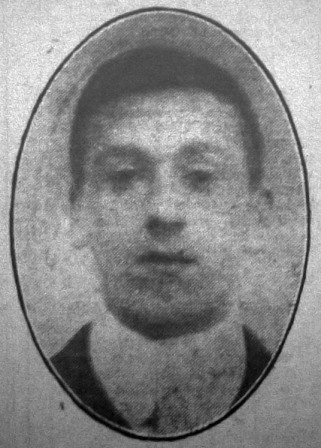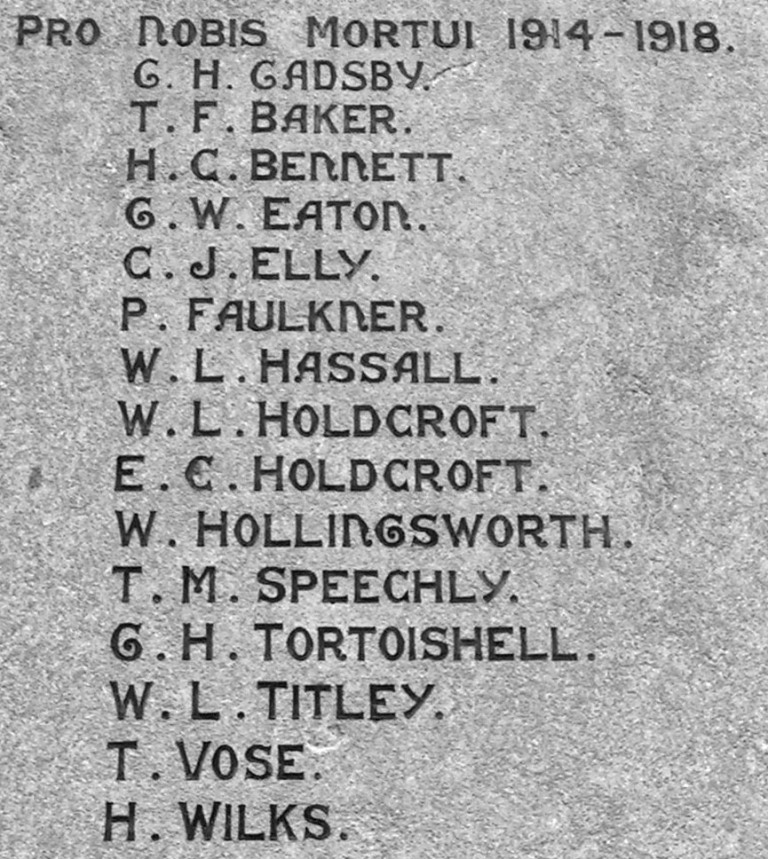
TITLEY, WALTER LOUIS ("Loo")

Photograph with kind permission from the Uttoxeter Advertiser
|
|
Source |
||||
|
CWGC |
SDGW |
Uttoxeter Advertiser |
Other |
||
|
Parents |
Walter and Ellen Titley |
Yes |
|
|
|
|
Mr. & Mrs. W. Titley |
|
|
|
5a |
|
|
Mr. & Mrs. Walter Titley |
|
|
1a |
2 |
|
|
Where born |
Native of Uttoxeter |
|
|
1a |
|
|
When born |
About 1886 |
|
|
|
4 |
|
Position in the family |
Had a brother John (‘Jack’) |
|
|
1a |
|
|
Address |
(Formerly) Colton House, Rocester Road, Uttoxeter |
|
|
1a |
2 |
|
Witton, Birmingham |
|
Yes |
|
|
|
|
Wilton, Birmingham, Warwickshire |
|
|
|
2 |
|
|
Parents: 50, Gerrard St., Lozells, Birmingham |
Yes |
|
|
|
|
|
Where educated |
Bradley Street School |
|
|
1a |
|
|
Thomas Alleyne’s Grammar School |
|
|
1a |
2 |
|
|
Spouse |
|
|
|
|
|
|
Children |
|
|
|
|
|
|
Employment Before Joining up |
Birmingham Electrical Works |
|
|
1a |
2 |
|
Where enlisted |
Birmingham, Warwickshire |
|
Yes |
|
2 |
|
Regiment |
Royal Warwickshire |
Yes |
Yes |
1a |
2, 5a |
|
Unit |
1st/8th Bn. |
Yes |
Yes |
|
|
|
1/8th (T,F.) Bn. |
|
|
|
2 |
|
|
Rank |
Private |
Yes |
Yes |
1a, 1c |
2, 5a |
|
Service Number |
2487 |
Yes |
Yes |
|
2 |
|
Date of Death |
30 April 1915 |
|
|
1c |
|
|
29 April 1915 |
Yes |
Yes |
|
2 |
|
|
Age at time of death |
29 |
Yes |
|
|
|
|
Where Killed or died |
Northern France |
|
|
|
|
|
France/Flanders |
|
Yes |
1c |
|
|
|
How he died |
Killed in Action |
|
Yes |
1a |
|
|
Killed whilst bomb-throwing |
|
|
1c |
|
|
|
Location of Grave or Memorial |
Trois Arbres Cemetery, Steenwerck Grave II. T. 6. |
Yes |
|
|
|
|
Uttoxeter Town War Memorial (Market Place) |
|
|
|
2,3 |
|
|
Thomas Alleyne’s School War Memorial, Uttoxeter |
|
|
|
2,3 |
|
|
Awards |
|
|
|
|
|
Walter was a native of Uttoxeter[7] and attended the Bradley Street School[1a]. He then won a scholarship and attended Thomas Alleyne’s Grammar School[1a].
|
|
 |
| The war memorial at Thomas Alleyne’s School | |
Before the War Walter and his brother Jack both worked for the Birmingham Electrical Works.
They evidently came from a comfortably-off family because their parents had at one time owned the mill on the Rocester Road[1b].
Walter joined the Warwickshire Regiment with his brother Jack soon after the outbreak of war[1a, 5a] and the served together. They were together when Walter met with his death, and Jack had a narrow escape[1a, 5a].
Walter was killed in action in Messines while bomb (an early name for grenade)-throwing[1c].
Shortly after his death, Jack wrote a letter to the Uttoxeter Advertiser , who published an extract[1b]. Jack was recovering from wounds in hospital at Rosherville, Gravesend, Kent. He had received his wounds at Neuve Eglise, between Ypres and Armentieres[1b].
The letter gives an insight into events the two brothers had experienced as well as the attitude taken to conscription by the regular soldiers of the British Expeditionary Force:
“Private Hoptroff’s remark about the Saxons running the Prussians and Bavarians down is quite true. I myself have heard them shout the following over to us:
‘We are Saxons. You are Anglo-Saxons. If you don’t fire at us we won’t fire at you. Save your bullets for the Bavarians – they are going to relieve us to-night!’
It would be quite easy to tell the difference the next day. Instead of friendly remarks being exchanged there would be a cursing match in all languages of Europe, I should think, to hear some of it. What used to make them more mad than anything was when our fellows shouted, ‘Come out in the open and fight it out with the bayonet, and let’s see what you are made of!’ Anyway, they never accepted the challenge.
The Germans seem very nervous at night-time. They keep up an incessant fire when it is impossible to see anything to shoot at, and constantly send up flares to light up the ground between the trenches. We do not depend on these tactics for our safety, but send out men between the lines. If anyone is seen advancing it is the duty of one to go back to warn his comrades whilst the other one holds on. It is a very dangerous job, as the men very often come in contact with the snipers, and there is no doubt about it they are persons to be respected, as they are armed with the latest pattern rifle and revolver, and also fire exploding bullets, from which, if one hits you, there is very little hope of recovering.
The men who go out are called the listening patrol, and it’s a real nerve-tester, I can tell you. I think I broke several of the commandments one night when I was out on this job. I had got some little distance out in the open when I got entangled in a lot of barbed wire, and just at the same the Germans sent up several flares. I was very lucky in not getting hit, as there were scores of bullets flying round. I had to take off my overcoat and equipment before I could extricate myself.
The constant strain is terrible for the nerves. The worst feeling of all is when you are being shelled. You seem absolutely helpless. If you look in the direction they are coming from you can sometimes see them. A dive for a dug-out or prostrate yourself quickly on the ground is the only thing to do – and then wait.
I saw a rather amusing incident one day in our trench whilst we were being shelled. Two men who could not find a dug-out to get into were taking it in turns to lie one on top of the other, so that each time a shell came over one at least would be fairly safe – the one underneath, I mean; but at about the seventh they forgot whose turn it was, and the result was we were entertained to a boxing match to relieve the strain a bit!
The boys at the front don’t trouble much about those who don’t join – the shirkers, I mean – those who ought to go to the butcher’s to get another heart! They are quite content to think that such as they will be amongst those who line the streets when they come marching back, feeling satisfied with themselves! They do not favour conscription; they would much rather the job be got through with a voluntary army. Of course, they fully realise the immense undertaking they have before them, and welcome all the help they can get, but the old soldiers don’t like the idea of conscription.”
In reporting his death, the Uttoxeter Advertiser[1a] said that news of his death had “caused the greatest regret amongst his many local friends”.
The Staffordshire Weekly Sentinel[5a] reported his death as follows:
Still another Uttoxeter soldier has given his life for his King and country; the latest addition to the local roll of honour being Private Walker Titley, formerly of Uttoxeter.
Private Titley joined the Warwickshire Regiment with his brother soon after the outbreak of war and they were together at the time Walter was killed, the brother having a narrow escape at the same time.
|
The memorial notice opposite was posted in the Uttoxeter Advertiser in April 1916[1c] to mark the first anniversary of his death |
TITLEY. – In Ever Loving Memory of Pte. Walter Titley (late of Uttoxeter), killed in France whilst bomb-throwing, April 30, 1915. “He giveth this life for his country.” Never forgotten. |